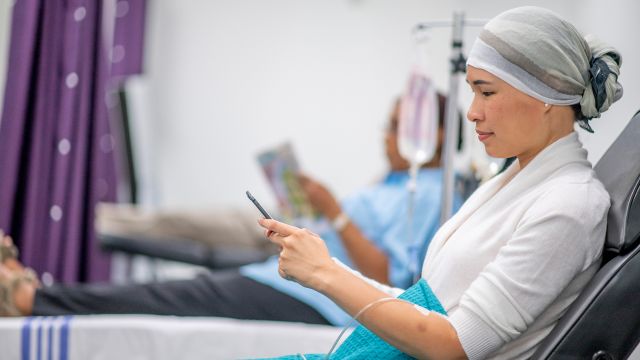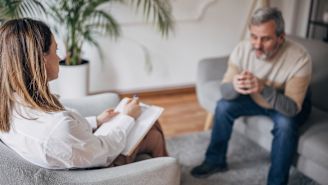Updated on March 28, 2024.
Chemotherapy (chemo) for cancer can have a range of unpleasant side effects. Knowing what to expect during and after chemo, and being prepared for treatment, can help ease your mind as you navigate your treatment.
How chemotherapy works
Chemotherapy is an intravenous (IV), injected directly into a vein, or oral medication mostly used to stop or slow the growth of cancer cells. Chemotherapy not only kills cancer cells, but healthy cells too, which is what causes possible side effects, such as nausea, vomiting, fatigue, and hair loss.
The form of chemotherapy you receive and the length of your treatment depend on the type of cancer you have and what your healthcare team advises to be the best option for you. Most people get chemotherapy through an IV directly into a vein, or injection at the hospital or outpatient facility over the course of weeks or months. But some people have a combination of therapies, such as less frequent IV infusions and oral medications taken at home.
Preparing for chemotherapy
The prospect of having chemotherapy may affect people differently. It is natural to experience a range of emotions, including anger or worry. Bringing someone to appointments to keep you company, help you take notes, and learn all the new information can be a big help, says Jennifer Oglesby, RN, OCN, an oncology nurse navigator in San Jose, California.
Staying organized is also helpful since treatment may involve different medications with varying instructions. Oglesby recommends using a binder and calendar to track your paperwork and appointments, including chemotherapy, blood tests, radiation treatments (which use high dose x-rays), and surgeries. A smartphone app can also be a good tool for taking notes and keeping records.
What to bring to treatment
Wear comfortable clothes, and shirts with short sleeves or buttons that allow easy access for the IV. You may also consider packing a bag that includes the following:
- Water: “One of the most important things during chemo is to keep yourself as hydrated as possible,” says Oglesby. Water is best for preparing your body for the dehydrating effects of chemo and may help lower your risk of issues like nausea and constipation.
- Healthy snacks: It’s important to eat nutrient-dense foods to keep your energy up and protect against infection, since chemotherapy lowers your immunity. Fruit, trail mix, cheese sticks, and peanut butter are popular options, but ask your healthcare team what foods are okay to eat.
- Something to do: Treatment may take several hours, so you’ll want to have something to do while you pass the time. Bring books and magazines, headphones and music, or a tablet for watching movies or playing games.
- Blanket and a pillow: Treatment rooms can feel cold, and IV fluids can make the cold sensation worse, so bring along a blanket to stay warm and a pillow for added comfort. Cozy socks are a good idea, too.
- Lip balm and skin cream: Chemo can dry your lips and skin. Hypoallergenic moisturizers that may be gentler on sensitive skin and lip products can reduce itchiness and irritation.
Chemotherapy side effects
Chemotherapy can cause multiple side effects. You may only experience a few periodically, or you may develop several at the same time. They can range from mild to severe, and sometimes you’ll be given a prescription to help prevent or relieve them. Some of the most common side effects include the following.
Fatigue. Almost everyone who goes through chemo experiences extreme tiredness. It’s frequently worst right after treatment and gets better over time, until the next treatment starts the cycle again.
Extra rest, physical activity, massage, and therapy may help ease fatigue, and eating a healthy diet as you are able can help keep energy levels up. Oglesby also recommends listening to your body. “Rest when you’re tired, but if you can, try to do things and live life as normally as possible,” she says. Speak with your healthcare team, too, since they can make additional recommendations or adjust medications that might be contributing to the issue.
Nausea. Feeling queasy or vomiting is another common side effect of chemotherapy. In most cases, you’ll be prescribed medication by your healthcare provider, who can also suggest ways to settle your stomach.
In general, Oglesby advises trying to eat small snacks and meals throughout the day and avoiding spicy, fatty, or greasy foods. Sipping drinks slowly over time may help, as can eating bland foods (like crackers) or sucking on hard candy or popsicles. On treatment days, consider having a small snack before you begin.
Immunity issues. Chemotherapy can damage your body’s ability to fight infections by causing neutropenia, a condition marked by low white blood cells that are part of your immune system. Your healthcare team will give you information during your first visit on what to do if this happens. If you have a fever at any point, it’s important to contact your provider right away.
“It’s also important [after treatment] that you wash your hands more frequently and stay away from friends and family that may potentially be sick,” says Oglesby. “This is especially crucial in the 7 to 14 days after treatment, when you’re more susceptible to infection.” Take care to avoid sharing eating utensils and toiletries, too.
Other common side effects of chemotherapy, according to the American Cancer Society, include:
- Anemia (low red blood cells, which can cause fatigue and brusing)
- Bruising and bleeding issues
- Constipation and/or diarrhea
- Changes in urine, bladder, or kidneys
- Changes in appetite
- Weight loss or gain
- Issues with sex drive, sexual function, and/or fertility (ability to reproduce and have a child)
- Problems with mental focus, often called “chemo brain”
- Mood swings
- Sores and pain in the mouth and/or throat
- Skin and/or nail changes
- Weakness, numbness, tingling, pain, and other nerve troubles, often in the hands and/or feet
Hair loss and chemotherapy
Not all chemotherapy medications causes hair loss. But for some people, this can be one of the most challenging side effects—even though it's temporary, Oglesby says. For those who receive a form of chemotherapy that results in hair loss, it often begins within weeks of starting treatment, and can affect the hair on the legs, arms, and face, as well as the head. “Many patients have ‘shave their head parties,’ with friends and family shaving their heads in support of their loved one going through treatment,” Oglesby says.
In 2017, the U.S. Food and Drug Administration (FDA) approved a cooling cap—a device designed to reduce hair loss during chemotherapy—for use by patients with any kind of solid tumor (cancers that do not affect the blood). Scalp cooling may help prevent hair loss by reducing blood flow to hair follicles. When the blood vessels constrict, the amount of chemotherapy drug that reaches hair follicles may be reduced.
If you do experience hair loss, your healthcare team may be able to help you find a low-cost or free wig or headgear. Also, the American Cancer Society offers classes such as Look Good Feel Better, where a licensed beauty professional gives tips on how to apply make-up, care for your skin, and use wigs and/or hairpieces while undergoing chemotherapy.
How friends and family can help
Going through chemotherapy may be challenging, but enlisting the help of friends and family can make it much easier. Try your best to ask for help or accept it when offered.
When your friends and family inquire about what they can do, suggest they bring over meals, keep you company, help with the kids if you have them, or help with housework. “Or just be there. Be a shoulder to cry on and a person to talk to,” says Oglesby.
Ask that loved ones avoid telling cancer horror stories, too. “Patients are scared enough as it is,” she says. “People have been cured of cancer, and gone on to live healthy lives, and I think that’s important to stress.”
For further questions about chemotherapy side effects, treatment for side effect, and what you insurance covers, talk with your healthcare provider.







